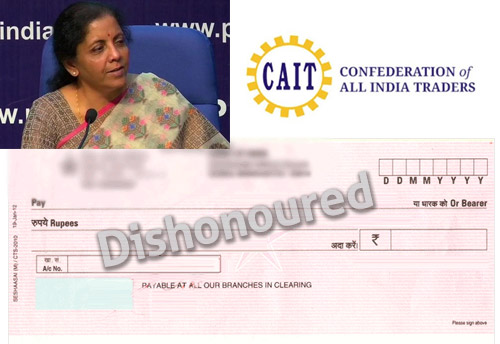Feared of hit on trade credit, CAIT to approach FM on decriminalization of Cheque bouncing
Updated: Jul 21, 2020 08:55:55am

Feared of hit on trade credit, CAIT to approach FM on decriminalization of Cheque bouncing
New Delhi, July 21 (KNN) The Confederation of All India Traders (CAIT) has government not to decriminalize bouncing of cheques, saying such a move will not only nullify the sanctity of the cheques and the Banking sector of India but also contradict the Prime Minister Narendra Modi’s vision of a fair and trustworthy business environment in the country.
In a letter to Finance Minister Nirmala Sitharaman, the traders body said, '' in a bid to improve ease of doing business and unclog the courts, the Government wants to do away with minor financial offences that do not impact national security and we understand the motive of the government, but to decriminalize a most important section like 138 will be like shooting in the foot as instead of creating a fair, honest and trustworthy business environment such a step will completely distort the business conditions and give tremendous rise to unfair and unethical trade practices all across the country.''
The CAIT said that not only the traders but people will also find it difficult to purchase any goods on EMI since EMI is always supported by post-dated cheques and henceforth no one will accept post-dated cheques, if it is decriminalised.
''One hand the Government has recently included Section 143 & 148 to make the NI Act more effective and powerful in providing redress to the complainants, on the other hand diluting the Act is completely unwarranted and contradictory,'' it added.
CAIT National President B C Bhartia & Secretary General Praveen Khandelwal said that bouncing of cheques issued against an enforceable debt must be taken as a very serious issue and there is an all-round voice from millions of traders that CAIT must make all efforts to stop the government from decriminalizing such an offence.
''Post-dated cheques are an important instrument of business in India and also ensure sufficiency of working capital by acting as guarantees for several modes of finance and credit,'' they added.
The duo further said that if the person issuing the cheque knowing that there is no criminal liability then it would give rise to the ease of being dishonest rather than promoting ease of doing business. The entire fundamentals of trade will be destroyed and traders will be left at the mercy of civil litigation which takes several years for justice.
''Even after the current stringent section 138, more than 20 per cent of all pendency of cases across the country is only pertaining to cheque bounce. If it is decriminalized, there will be complete disarray and disturbance in trade dynamics,'' they said.
The finance ministry has proposed to decriminalise a host of minor offences, including those related to cheque bounce and repayment of loans, in as many as 19 legislations to help businesses tide over the crisis caused by the coronavirus pandemic.
The 19 legislations include the Negotiable Instruments Act (cheque bounce); SARFAESI Act, 2002 (repayment of bank loans); Life Insurance Corporation Act, 1956; PFRDA Act, 2013; RBI Act, 1934; National Housing Bank Act, 1987; Banking Regulation Act, 1949; and Chit Funds Act, 1982.











